- Home
- Iain M. Banks
The Wasp Factory Page 6
The Wasp Factory Read online
Page 6
Mothers told their children to behave or Eric Cauldhame would get them and do horrible things to them with worms and maggots. As I suppose was inevitable, the story gradually became that Eric would set fire to them, not just their pet dogs; and, as was probably also inevitable, a lot of kids started to think that I was Eric, or that I got up to the same tricks. Or perhaps their parents guessed about Blyth, Paul and Esmerelda. Whatever, they would run from me, or shout rude things from a distance, so I kept a low profile and restricted my brief visits to the town to a taciturn minimum. I get the odd funny look to this day, from children, youths and adults, and I know some mothers tell their children to behave or ‘Frank’ll get you,’ but it doesn’t bother me. I can take it.
I got on my bike and went back to the house a bit recklessly, shooting through puddles on the path and taking the Jump - a bit on the path where there’s a long downhill on a dune and then a short uphill where it’s easy to leave the ground - at a good forty kilometres per hour, landing with a muddy thump that nearly had me in the whin bushes and left me with a very sore bum, making me want to keep opening my mouth with the feeling of it. But I got back safely. I told my father I was all right and I’d be in for my dinner in an hour or so, then went back to the shed to wipe Gravel down. After I’d done that I made up some new bombs to replace the ones I’d used the day before, and a few extra besides. I put the old electric fire on in the shed, not so much to warm me as to keep the highly hygroscopic mixture from absorbing moisture out of a damp air.
What I’d really like, of course, is not to have to bother with lugging kilo bags of sugar and tins of weedkiller back from the town to stuff into electrical-conduit piping which Jamie the dwarf gets for me from the building contractor’s where he works in Porteneil. With a cellar full of enough cordite to wipe half the island off the map it does seem a bit daft, but my father won’t let me near the stuff.
It was his father, Colin Cauldhame, who got the cordite from the ship-breaking yard there used to be down the coast. One of his relations worked there, and had found some old warship with one magazine still loaded with the explosive. Colin bought the cordite and used it to light fires with. Uncontained, cordite makes a very good fire-lighter. Colin bought enough to last the house about two hundred years, even if his son had continued using it, so perhaps he was thinking of selling it. I know that my father did use it for a while, lighting the stove with it, but he hasn’t for a while. God knows how much there still is down there; I’ve seen great stacks and bales of it still with the Royal Navy markings on it, and I’ve dreamed up any number of ways of getting at it, but short of tunnelling in from the shed and taking the cordite out from the back, so that the bales looked untouched from the inside of the cellar, I don’t see how I could do it. My father checks the cellar every few weeks, going nervously down with a torch, counting the bales and sniffing, and looking at the thermometer and hygrometer.
It’s nice and cool inside the cellar, and not damp, though I guess it can only be just above the water table, and my father seems to know what he’s doing and is confident that the explosive hasn’t become unstable, but I think he’s nervous about it and has been ever since the Bomb Circle. (Guilty again; that was my fault, too. My second murder, the one when I think some of the family started to suspect.) If he’s that frightened, though, I don’t know why he doesn’t just throw it out. But I think he’s got his own little superstition about the cordite. Something about a link with the past, or an evil demon we have lurking, a symbol for all our family misdeeds; waiting, perhaps, one day, to surprise us.
Anyway, I have no access to it, and have to cart metres of black metal piping back from the town and sweat and labour over it, bending it and cutting it and boring it and crimping it and bending it again, straining with it in the vice until the bench and shed creak with my efforts. I suppose it’s a craft in some ways, and certainly it is quite skilled, but I get bored with it sometimes, and only thinking of the use I’ll put those little black torpedoes to keeps me heaving and bending away.
I tidied everything away and cleaned the shed up after my bomb-making activity, then went in for dinner.
‘They’re searching for him,’ my father said suddenly, in between mouthfuls of cabbage and soya chunks. His dark eyes flickered at me like a long sooty flame, then he looked down again. I drank some of the beer I had opened. The new batch of home-brew tasted better than the last lot, and stronger.
‘Eric?’
‘Yes, Eric. They’re looking for him on the moors.’
‘On the moors?’
‘They think he might be on the moors.’
‘Yes, that would account for them looking for him there.’
‘Indeed,’ my father nodded. ‘Why are you humming?’ I cleared my throat and kept on eating my burgers, pretending I hadn’t heard him properly.
‘I was thinking,’ he said, then spooned some more of the green-brown mixture into his face and chewed for a long time. I waited to hear what he was going to say next. He waved his spoon slackly, pointing it vaguely upstairs, then said: ‘How long would you say the flex on the telephone is?’
‘Loose or stretched?’ I said quickly, putting down my glass of beer. He grunted and said nothing else, going back to his plate of food, apparently satisfied if not pleased. I drank.
‘Is there anything special you’d like me to order from the town?’ he said eventually, as he rinsed his mouth with real orange juice. I shook my head, drank my beer.
‘No, just the usual,’ I shrugged.
‘Instant potatoes and beefburgers and sugar and mince pies and cornflakes and junk like that, I suppose.’ My father sneered slightly, though it was said evenly enough.
I nodded. ‘Yes, that’ll do fine. You know my likes.’
‘You don’t eat properly. I should have been more strict with you.’
I didn’t say anything, but kept on eating slowly. I could tell that my father was looking at me from the other end of the table, swilling his juice round in his glass and staring at my head as I bent over my plate. He shook his head and got up from the table, taking his plate to the sink to rinse it.
‘Are you going out tonight?’ he asked, turning on the tap.
‘No. I’ll stay in tonight. Go out tomorrow night.’
‘I hope you won’t be getting steaming drunk again. You’ll be arrested some night and then where will we be?’ He looked at me. ‘Eh?’
‘I don’t go getting steaming drunk,’ I assured him. ‘I just have a drink or two to be sociable and that’s all.’
‘Well, you’re very noisy when you come back for somebody who’s only been sociable, so you are.’ He looked at me darkly again and sat down.
I shrugged. Of course I get drunk. What the hell’s the point of drinking if you don’t get drunk? But I’m careful; I don’t want to cause any complications.
‘Well, just you be careful, then. I always know how much you’ve had from your farts.’ He snorted, as though imitating one.
My father has a theory about the link between mind and bowel being both crucial and very direct. It’s another of his ideas which he keeps trying to interest people in; he has a manuscript on the subject (‘The State of the Fart’) which he also sends away to London to publishers now and again and which they of course send back by return. He has variously claimed that from farts he can tell not only what people have eaten or drunk, but also the sort of person they are, what they ought to eat, whether they are emotionally unstable or upset, whether they are keeping secrets, laughing at you behind your back or trying to ingratiate themselves with you, and even what they are thinking about at the precise moment they issue the fart (this largely from the sound). All total nonsense.
‘H’m,’ I said, non-committal to a fault.
‘Oh, I can,’ he said as I finished my meal and leaned back, wiping my mouth on the back of my hand, more to annoy him than anything else. He kept nodding. ‘I know when you’ve had Heavy, or Lager. And I’ve smelt Guinness off you, too.’
>
‘I don’t drink Guinness,’ I lied, secretly impressed. ‘I’m afraid of getting athlete’s throat.’
This witticism was lost on him apparently, for without a pause he continued: ‘It’s just money down the drain, you know. Don’t expect me to finance your alcoholism.’
‘Oh, you’re being silly,’ I said, and stood up.
‘I know what I’m talking about. I’ve seen better men than you think they could handle the drink and end up in the gutter with a bottle of the fortified wine.’
If that last sally was intended to go below the belt, it failed; the ‘better men than you’ line was worked out long ago.
‘Well, it’s my life, isn’t it?’ I said and, putting my plate in the sink, left the kitchen. My father said nothing.
That night I watched television and did some paperwork, amending the maps to include the newly named Black Destroyer Hill, writing a brief description of what I’d done to the rabbits and logging both the effects of the bombs that I’d used and the manufacture of the latest batch. I determined to keep the Polaroid with the War Bag in future; for low-risk, punitive expeditions like that against the rabbits it would more than repay the extra weight and the amount of time consumed using it. Of course, for serious devilry the War Bag has to go by itself, and a camera would just be a liability, but I haven’t had a real threat for a couple of years, since the time some big boys in the town took to bullying me in Porteneil and ambushing me on the path.
I thought things were going to get pretty heavy for a while, but they never did escalate the way I thought they might. I threatened them with my knife once, after they stopped me on my bike and started pushing me around and demanding money. They backed off that time, but a few days later they tried to invade the island. I held them off with steelies and stones, and they fired back with air-guns, and for a while it was quite exciting, but then Mrs Clamp came with the weekly messages and threatened to call the police, and after calling her a few nasty names they left.
I started the cache system then, building up supplies of steelies, stones, bolts and lead fishing-weights buried in plastic bags and boxes at strategic points around the island. I also set up snares and trip-wires linked to glass bottles in the grass on the dunes over the creek, so that if anybody tried to sneak up they would either catch themselves or snag the wire, pulling the bottle out of its hole in the sand and down on to a stone. I sat up for the next few nights, my head poking out of the back skylight of the loft, my ears straining for the tinkle of glass breaking or muffled curses, or the more usual signal of the birds being disturbed and taking flight, but nothing more happened. I just avoided the boys in the town for a while, only going in with my father or at times when I knew they would be in school.
The cache system survives, and I’ve even added a couple of petrol bombs to one or two of the secret stores, where a likely avenue of attack comes in over terrain the bottles would smash on, but the trip-wires I’ve dismantled and left in the shed. My Defence Manual, which contains things like maps of the island with the caches marked, likely attack routes, a summary of tactics, a list of weapons I have or might make, includes within this last category quite a few unpleasant things like trip-wires and snares set a body-length away from a concealed broken bottle sticking up in the grass, electrically detonated mines made from pipe-bombs and small nails, all buried in the sand, and a few interesting, if unlikely, secret weapons, like frisbees with razors embedded in the edge.
Not that I want to kill anybody now, but it is all for defence rather than offence, and it does make me feel a lot more secure. Soon I’ll have enough money for a really powerful crossbow, and that I’m certainly looking forward to; it’ll help make up for the fact that I’ve never been able to persuade my father to buy a rifle or a shotgun that I could use sometimes. I have my catapults and slings and air-rifle, and they could all be lethal in the right circumstances, but they just don’t have the long-range hitting power I really hanker after. The pipe-bombs are the same. They have to be placed, or at best thrown at the target, and even slinging some of the purpose-built smaller ones is inaccurate and slow. I can imagine some unpleasant things happening with the sling, too; the sling-bombs have to be on a pretty short fuse if they’re to detonate soon enough after they land not to be throw-backable, and I’ve had a couple of close calls already when they’ve gone off just after they left the sling.
I’ve experimented with guns, of course, both mere projectile weapons and mortars which would lob the sling-bombs, but they have all been clumsy, dangerous, slow and rather prone to blowing up.
A shotgun would be ideal, though I’d settle for a .22 rifle, but a crossbow will just have to do. Perhaps sometime I’ll be able to devise a way round my official non-existence and apply for a gun myself, though even then, all things considered, I might not be granted a licence. Oh, to be in America, I occasionally think.
I was logging the cache petrol bombs which hadn’t been inspected for evaporation recently when the phone went. I looked at my watch, surprised at the lateness of the hour: nearly eleven. I ran downstairs to the phone, hearing my father coming to the door of his room as I passed it.
‘Porteneil 531.’ Pips sounded.
‘Fuck it, Frank, I’ve got luna maria callouses on me feet. How the hell are ye, me young bucko?’
I looked at the handset, then up at my father, who was leaning over the rail from the floor above, tucking his pyjama top into his trousers. I spoke into the phone: ‘Hello there, Jamie, what are you doing calling me this late?’
‘Wha—? Oh, the old man’s there, is he?’ Eric said. ‘Tell him he’s a bag of effervescent pus, from me.’
‘Jamie sends his regards,’ I called up to my father, who turned without a word and went back to his room. I heard the door close. I turned back to the phone. ‘Eric, where are you this time?’
‘Ah, shit, I’m not telling you. Guess.’
‘Well, I don’t know . . . Glasgow?’
‘Ah ha ha ha ha ha!’ Eric cackled. I clenched plastic.
‘How are you? Are you all right?’
‘I’m fine. How are you?’
‘Great. Look, how are you eating? Have you got any money? Are you hitching lifts or what? They’re looking for you, you know, but there hasn’t been anything on the news yet. You haven’t—’ I stopped before I said something he might take exception to.
‘I’m doing fine. I eat dogs! Heh heh heh!’
I groaned. ‘Oh, God, you’re not really, are you?’
‘What else can I eat? It’s great, Frankie boy; I’m keeping to the fields and the woods and walking a lot and getting lifts and when I get near a town I look for a good fat juicy dog and I make friends with it and take it out to the woods and then I kill it and eat it. What could be simpler? I do love the outdoor life.’
‘You are cooking them, aren’t you?’
‘Of course I’m fucking cooking them,’ Eric said indignantly. ‘What do you think I am?’
‘Is that all you’re eating?’
‘No. I steal things. Shoplift. It’s so easy. I steal things I can’t eat, just for the hell of it. Like tampons and plastic dustbin-liners and party-size packets of crisps and one hundred cocktail sticks and twelve cake-candles in various colours and photograph frames and steering-wheel covers in simulated leather and towel-holders and fabric-softeners and double-action air-fresheners to waft away those lingering kitchen smells and cute little boxes for awkward odds and ends and packs of cassettes and lockable petrol-caps and record-cleaners and telephone indexes slimming magazines pot-holders packs of name-labels artificial eyelashes make-up boxes anti-smoking mixture toy watches—’
‘Don’t you like crisps?’ I broke in quickly.
‘Eh?’ He sounded confused.
‘You mentioned party-size packets of crisps as being something you couldn’t eat.’
‘For Christ’s sake, Frank, could you eat a party-size packet of crisps?’
‘And how are you keeping?’ I said quickly. ‘I
mean, you must be sleeping rough. Aren’t you catching cold or something?’
‘I’m not sleeping.’
‘You’re not sleeping?’
‘Of course not. You don’t have to sleep. That’s just something they tell you to keep control over you. Nobody has to sleep; you’re taught to sleep when you’re a kid. If you’re really determined, you can get over it. I’ve got over the need to sleep. I never sleep now. That way it’s a lot easier to keep watch and make sure they don’t creep up on you, and you can keep going as well. Nothing like keeping going. You become like a ship.’
‘Like a ship?’ Now I was confused.
‘Stop repeating everything I say, Frank.’ I heard him put more money into the box. ‘I’ll teach you how not to sleep when I get back.’
‘Thanks. When do you expect to get here?’
‘Sooner or later. Ha ha ha ha ha!’
‘Look, Eric, why are you eating dogs if you can steal all that stuff?’
‘I’ve already told you, you idiot; you can’t eat any of that crap.’
‘But, then, why not steal stuff you can eat and don’t steal the stuff you can’t and don’t bother with the dogs?’ I suggested. I already knew it wasn’t a good idea; I could hear the tone of my voice rising higher and higher as I spoke the sentence, and that was always a sign I was getting into some sort of verbal mess.

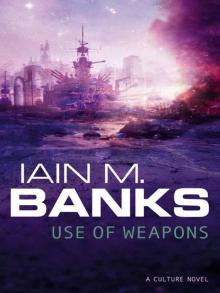 Use of Weapons
Use of Weapons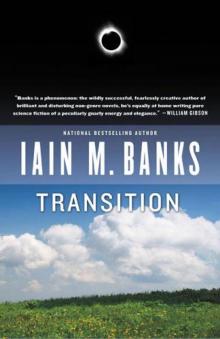 Transition
Transition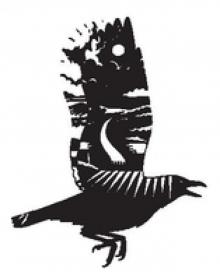 The Crow Road
The Crow Road Feersum Endjinn
Feersum Endjinn Matter
Matter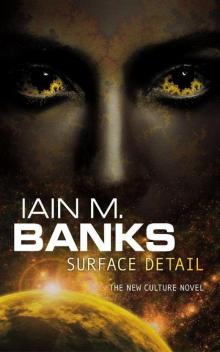 Surface Detail
Surface Detail The Wasp Factory
The Wasp Factory Consider Phlebas
Consider Phlebas Against a Dark Background
Against a Dark Background Excession
Excession The Hydrogen Sonata
The Hydrogen Sonata The Algebraist
The Algebraist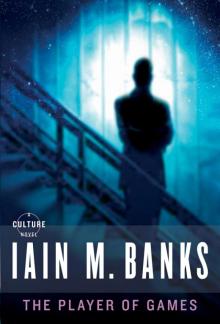 The Player of Games
The Player of Games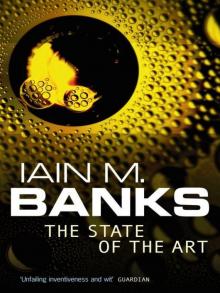 The State of the Art
The State of the Art The Hydrogen Sonata c-10
The Hydrogen Sonata c-10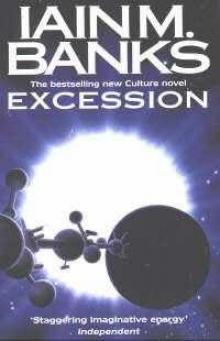 Excession c-5
Excession c-5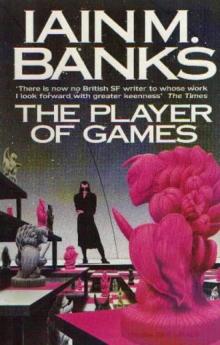 The Player of Games c-2
The Player of Games c-2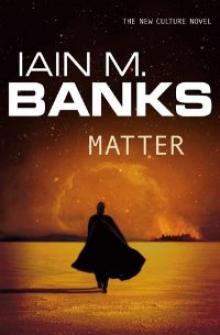 Matter c-8
Matter c-8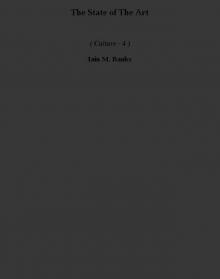 The State of The Art c-4
The State of The Art c-4 Look to Windward c-7
Look to Windward c-7 Consider Phlebas c-1
Consider Phlebas c-1